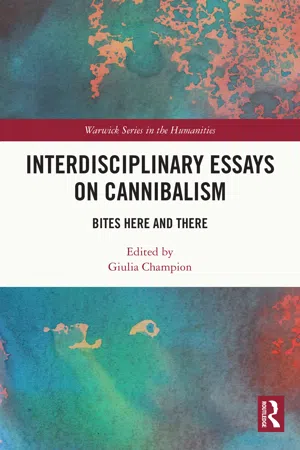
Interdisciplinary Essays on Cannibalism
Bites Here and There
- 286 pages
- English
- ePUB (mobile friendly)
- Available on iOS & Android
About This Book
Interdisciplinary Essays on Cannibalism: Bites Here and There brings together a range of works exploring the evolution of cannibalism, literally and metaphorically, diachronically and across disciplines. This edited collection aims to promote a conversation on the evolution and the different uses of the tropes and figures of cannibalism, in order to understand and deconstruct the fascination with anthropophagy, its continued afterlife and its relation to different disciplines and spaces of discourse. In order to do so, the contributing authors shed a new light not only on the concept, but also propose to explore cannibalism through new optics and theories. Spanning 15 chapters, the collection explores cannibalism across disciplines and fields from Antiquity to contemporary speculative fiction, considering history, anthropology, visual and film studies, philosophy, feminist theories, psychoanalysis and museum practices. This collection of thoughtful and thought-provoking scholarly contributions suggests the importance of cannibalism in understanding human history and social relations.
Frequently asked questions
Information
Part I
Cannibals with (Pitch)Forks
Introduction
A Severed Head on a Silver Platter: Bloody Banquets, Revenge Cannibalism and Future Foodways
[t]he need for food exposes the vulnerability of individual identity, enacted at a wider social level in the need for exchanges, communion, and commerce with others, through which the individual is absorbed into a larger corporate body. Eating is the most basic of all these needs, which it can also stand for, and in most cultures it is regulated by strict social practices that determine what can and what cannot be eaten. As ‘you are what you eat,’ eating is a means of asserting and controlling individual and also cultural identity.2
Table of contents
- Cover
- Half Title
- Series Page
- Title Page
- Copyright Page
- Table of Contents
- List of Figures
- Acknowledgements
- List of Contributors
- Preface: Bites Here and There
- Part I: Cannibals with (Pitch)Forks
- Part II: The Anthropophagus Complex
- Part III: Not Just Another Piece of Meat
- Part IV: (De)Meatifying and Digesting the Other
- Index